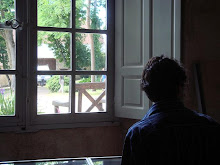Bludgeoning the Poor
A rather interesting episode is retold in a book which could aptly be described as a 'guide' to the philosophy dealing with the problem of evil found in Baudelaire, Nietzsche and Hitler.
It involves Baudelaire and is contained within the brief chapter 'Baudelaire on Bludgeoning the Poor'. While the title certainly does not imply a manifesto on humanitarianism, the story is for me an appropriate example of the paradoxical nature of seeming inferiority and the true, natural necessity for intense, sudden sensations as the guiding principles of the mystery of human judgement.
'He (Baudelaire) went outside and as he was entering a cabaret, a beggar reached out of his hat to him... At that very instant a familiar voice whispered in his ear. It was the voice of the ''demon of action, the demon of combat, that good angel, or good demon,'' who accompanied the poet everywhere he went to advise, prompt, persuade him. The voice whispered: ''Only he is equal to another who proves it, and he alone is worthy of freedom and who knows how to conquer it.''
At that point, the poet instantly jumped upon the beggar and with a single blow of the fist hit him in the eye, which in a second's time grew as big as a ball...grabbing a big branch, the poet commenced to beat the old man with the obstinate energy of a cook tenderizing a piece of steak.
Then all of a sudden, inspiring in the poet what he called the pleasure of a philosopher confirming the excellence of a theory, the ''antiquated carcass'' that he had beaten over turned over, stood up with more energy than the poet ever would have suspected to find ''in so singularly broken down machine, '' and with a look of hatred that seemed a good omen to the poet, that ''decrepit brigand'' threw himself upon his attacker, blackened both eyes, broke four teeth, and laid him flat.
The poet concluded that this strong medicine had given the old man back his pride and his life.'
The Roots and Flowers of Evil in Baudelaire, Nietzsche, and Hitler by Claire Ortiz Hill
This argument certainly has some logic to it, and there is a pleasant air of rejuvenation in it which I find rather attractive. The idea of violence, provoked merely by the intricate workings of human sensations, inependent of any deep political or philosophical convictions, is appealing because it transcends morality inasmuch as it takes into account the idea of human irrationality and inexorable strive towards chaos. If that is taken out of the equation, what are we left with but a monotonous continuum of impotent rumination, hence a singular, plebeian state of being. In our seemingly perpetual reflective existence, there is the recurring theme of helplesness which I've noticed bloggers are prone to experiencing. In their well-carved out posts, they assume the role of tragedians - pouring volumes of scornful, sometimes demonic remarks and commentaries so as to provoke an openly-desired mass of comments which often total strangers stumble across, initially bewildered but gradually recognising the general gist of it all. That moment of recognition triggers certain impulses within the mind which could be compared with the 'demon of action' referenced in the passage above- a revitalisation of the essential driving force of action - impetuousity. The almost sinister atmosphere created by one suddenly finding oneself amid a highly-charged sea of insomniac bloggers is enticing because of its murkiness and because it represents what could quite possibly be a previously unexplored area of mental abstraction, so elegantly manifested in blogs.
While there is hardly any novelty in the concept of 'bludgeoning the poor', if its basic substance serves the role of an 'energizer' its value could most fittingly be found within that unity and strange coherence that it forms between individual bloggers. Their endless strife for intellectual insight, their ineluctable desire to vent their views through the sinister latency of late-night blogging, though physically and perhaps psychologically unhealthy, is what ultimately prevails.
They bludgeon each other and here lies their strength.
